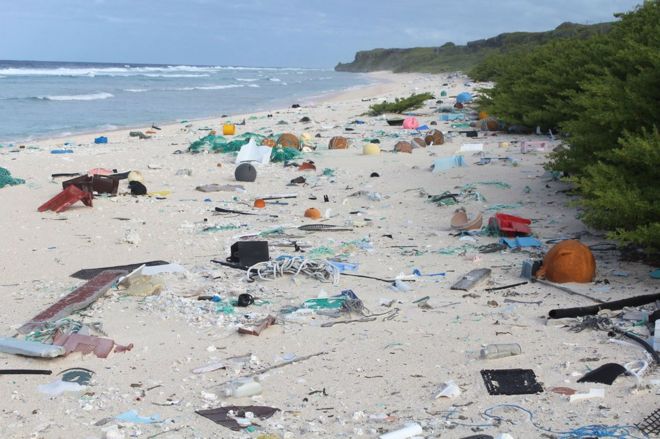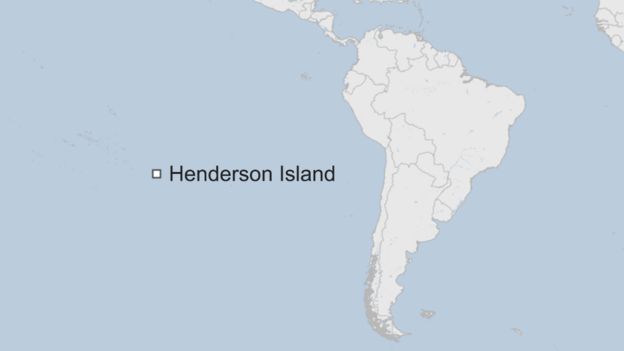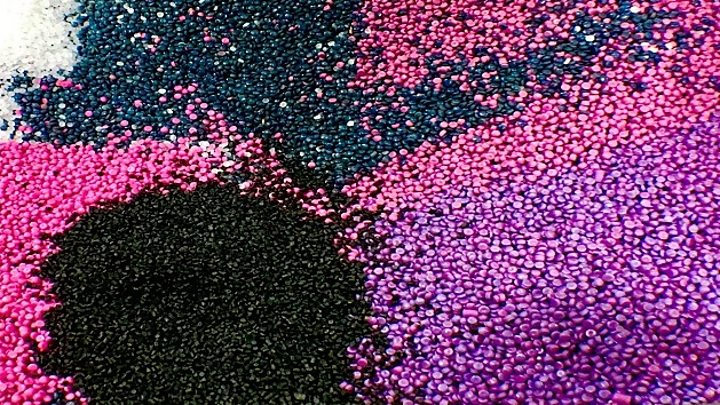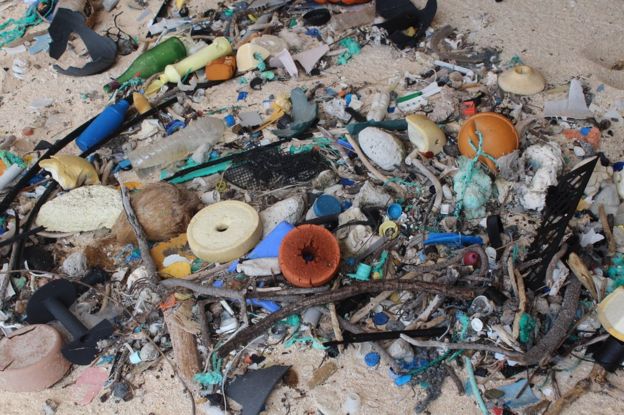
Henderson Island is part of the UK's Pitcairn Islands group
An uninhabited island in the South Pacific is littered with the highest density of plastic waste anywhere in the world, according to a study. Henderson Island, part of the UK's Pitcairn Islands group, has an estimated 37.7 million pieces of debris on its beaches.
The island is near the centre of an ocean current, meaning it collects much garbage from boats, large ships and South America. Researchers hope people will "rethink their relationship with plastic".
The joint Australian and British study said the rubbish amounted to 671 items per square meter and a total of 17 tons.
"A lot of the items on Henderson Island are what we wrongly refer to as disposable or single-use," said Dr Jennifer Lavers from the University of Tasmania.
The island is near the centre of an ocean current, meaning it collects much garbage from boats, large ships and South America. Researchers hope people will "rethink their relationship with plastic".
The joint Australian and British study said the rubbish amounted to 671 items per square meter and a total of 17 tons.
"A lot of the items on Henderson Island are what we wrongly refer to as disposable or single-use," said Dr Jennifer Lavers from the University of Tasmania.

The study, published in the journal Proceedings of the National Academy of Sciences, described how remote islands act as a "sink" for the world's rubbish.
In addition to fishing items, Henderson Island was strewn with everyday things including toothbrushes, cigarette lighters and razors.
In addition to fishing items, Henderson Island was strewn with everyday things including toothbrushes, cigarette lighters and razors.

Could plastic roads help to save the planet? It is one solution being studied.
"Land crabs are making their homes inside bottle caps, containers and jars," Dr Lavers said.
"At first it looks a little bit cute, but it's not. This plastic is old, it's sharp, it's brittle and toxic." Aquatic animals are being put at high risk from the toxins in our garbage, even though they are attempting to adapt to it.
A large number of hard hats of "every shape, color and size" were also discovered, the marine scientist said.
Henderson Island is listed by Unesco as a coral atoll with a relatively unique ecology, notable for 10 rare plant and four bird species.
It is 190km (120 miles) from Pitcairn Island, about 5,000km from Chile, and sits near the centre of the South Pacific Gyre - a massive rotating current.
"At first it looks a little bit cute, but it's not. This plastic is old, it's sharp, it's brittle and toxic." Aquatic animals are being put at high risk from the toxins in our garbage, even though they are attempting to adapt to it.
A large number of hard hats of "every shape, color and size" were also discovered, the marine scientist said.
Henderson Island is listed by Unesco as a coral atoll with a relatively unique ecology, notable for 10 rare plant and four bird species.
It is 190km (120 miles) from Pitcairn Island, about 5,000km from Chile, and sits near the centre of the South Pacific Gyre - a massive rotating current.

The researchers estimate the rubbish to total 37.7 million pieces
The condition of the island highlighted how plastic debris has affected the environment on a global scale, Dr Lavers said.
"Almost every island in the world and almost every species in the ocean is now being shown to be impacted one way or another by our waste," she said.
"There's not really any one person or any one country that gets a free pass on this."
She said plastic was devastating to oceans because it was buoyant and durable.
The research was conducted by the University of Tasmania's Institute for Marine and Antarctic Studies, and the Centre for Conservation Science at the Royal Society for the Protection of Birds.
"Almost every island in the world and almost every species in the ocean is now being shown to be impacted one way or another by our waste," she said.
"There's not really any one person or any one country that gets a free pass on this."
She said plastic was devastating to oceans because it was buoyant and durable.
The research was conducted by the University of Tasmania's Institute for Marine and Antarctic Studies, and the Centre for Conservation Science at the Royal Society for the Protection of Birds.
There is no longer any safe habitat for wildlife. We have poisoned every corner of the planet on land and in water and even defiled the air we need to breath. Is there any hope for our wildlife ?? Where the creatures of the earth go, we follow. If we had the ability to look two hundred years into the future, I do not think we'd recover from the shock.

No comments:
Post a Comment